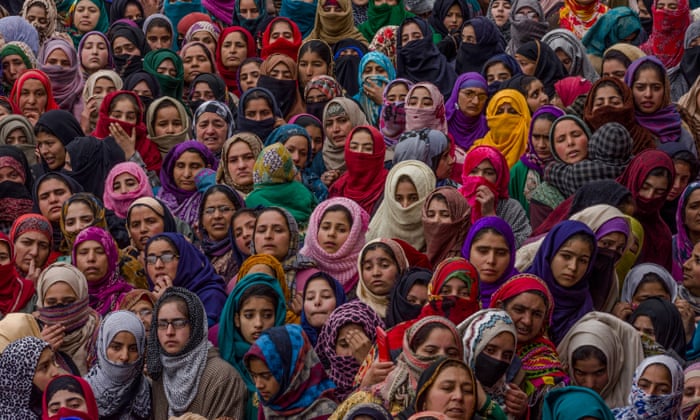- UID
- 20
- Online time
- Hours
- Posts
- Reg time
- 24-8-2017
- Last login
- 1-1-1970
|
|
━━━━━━━━━━━━━━━━━
Nerendra Modi’s refusal to speak to the separatists and his party’s anti-Muslim agenda fuel a vicious cycle of violence and retaliation.

Muslim women attend the funeral of Kashmiri rebels killed in a gun battle with Indian forces on 4 January. Photograph: Yawar Nazir/Getty Images
▼ On Friday, the four-day-long military flare-up between Pakistan and India began winding down, with Islamabad handing backan Indian air force pilot taken captive by the Pakistan army two days earlier. He had been shot down in the first aerial fighter combat between the two South Asian enemies since a full-scale war in 1971.
Yet, forgotten in the Indian euphoria is the fact that Kashmir, where the deaths of 40 security men in a suicide bomb attacklast month triggered this latest crisis, continues to simmer. Even as the pilot walked free, four policemen died in an encounter with Kashmiri militants.
The wider story in a crisis with such potential devastation, involving, as it does, nuclear powers, is that the Modi government has launched a nationwide anti-Muslim agenda that regards Muslims as unpatriotic, Pakistanas a cunning and implacable foe and Kashmiri separatists as its willing tools.
In the narrative of the ruling National Democratic Alliance, which Narendra Modiof the Hindu nationalist BJP has headed for almost five years, all violence in Kashmir is blamed on Pakistan. To be sure, Pakistan has inflamed the separatist movement with diplomatic and moral support, weapons, training and even jihadist fighters sent by the army to serve “tenures” in Kashmir.
Border areas
Yet the wellsprings of Kashmiri separatism are indigenous and sustained Indian mismanagement means Pakistan now needs to do little to keep Kashmirburning. Successive governments, including the Congress-led United Progressive Alliance that ran India from 2004 to 2014, are guilty of neglecting the province. However, Modi’s has made neglect into a strategy.
Advised by Ajit Doval, a former intelligence chief who is now national security adviser, Modi seeks to tire out the Kashmiri resistance. This involves refusing to acknowledge the political root of the Jammu and Kashmir problem, treating it instead as a mere security issue that is best managed by giving the security forces a free hand.
Kashmiri separatist leaders and the young people who come out on the streets at their behest are considered Muslim traitors, rather than the manifestation of a political problem that has to be discussed and resolved, not militarily crushed.
Modi’s hard line on Kashmir and Pakistan dovetails conveniently with the BJP’s “Hindutva” ideology, which rests on the notion of a Hindu culture and civilisation and, therefrom, a consolidated Hindu vote bank. Towns, villages and campuses across Kashmir simmer with resentment at Modi’s encouragement, or at least toleration, of a profoundly anti-Muslim agenda. Young Kashmiris point to militantgau raksha(cow protection), initiatives such asghar wapsi(reconversion to Hinduism), regulations preventing Muslims from praying in public and the “love jihad” bogey that propagates a narrative of Muslim men feigning love to Hindu women to convert them to Islam. (▪ ▪ ▪)
► Please, continue reading this article here: Source |
|